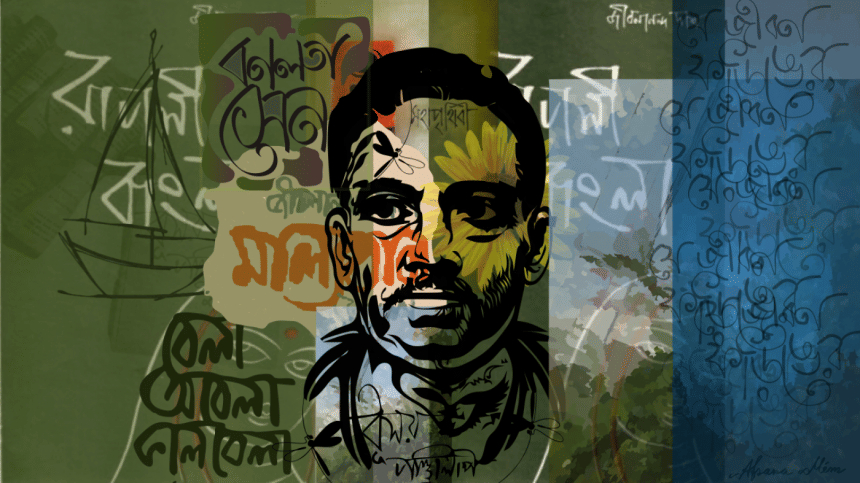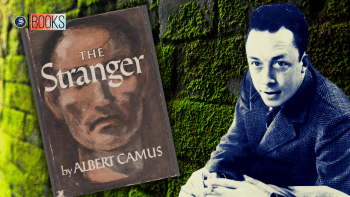Jibanananda Das: What happened to him “One Day Eight Years Ago”?

Unless you are familiar with the reference to the poem, the title probably confused you. No, it's not about Jibanananda Das himself, but one of his poems' protagonists who did something strange. The 10th poem from Jibanananda's Mahaprithibi tells the story of a person who had everything in life but still, for a strange feeling, an unknown ambivalence, chose to hang himself and now is lying in a morgue.
At the beginning and toward the end of the poem, the poet clarifies that the protagonist had a satisfying marital and material life. In the first stanza, the poet describes,
"His wife lay beside - his child too;
He had love, and dream."
A similar idea is reflected in the second last stanza, where the poet says,
"No woman jilted him in love.
He did not miss
A bit of marital bliss;
His wife went beyond what the times required
And gave him the taste of honey -
Honey from the hive of her mind;"
In the following few lines, we also get the idea that this person owned "riches", had done good "deeds", and even was blessed with "a life of ease". But these worldly pleasures were not enough for him. Something troubled his soul that he himself couldn't comprehend. And this troubled feeling is the reason he chooses to commit suicide.
But what can be the reason here?
One interpretation is that the protagonist was burdened by his loneliness. In the poem, the strange feeling that instigated the person to commit suicide was conveyed to him by "a silence like the neck of a camel."
Sumita Chakravarty's interpretation says that this surrealistic imagery (or a metaphysical conceit?) indicates the feeling of loneliness that a desert evokes. The silent sense of solitude glided to the protagonist the way a camel would quietly stretch its long neck into the tent of bedouins.
The loneliness felt strange to him because he had a wife and a child. There is no reason for him to feel deserted while they lay right beside. Although he can't detect what it is, he infers that it's not merely loneliness. There's something more to it that trammeled his existence, and he wanted to escape the suffocation. He believed if he kills himself, he,
"Will not face anymore the stress
The heavy burden -
The deep unceasing pain of consciousness."
What is this pain-laden consciousness? It's a macabre realization that the poet either does not or refuses to understand. Toward the end of the poem, the poet again mentions that this "beguiling disaster", this "baffling shock," constantly "frolics in our blood". In other words, it's something we all feel, yet the feeling is a stranger to us.
This same consciousness is referred to in another of Jibanananda's poems, "Bodh" or "Sensation". Here, the poet says,
"Within my head,
Not a dream, but some sensation works its will.
I cannot escape it."
The poetic persona explicitly says this feeling is impossible to get rid of, and this inescapable sensation induces a nihilistic sentiment. In the poet's words,
"All thought - all times of prayer,
Seem empty,
Empty, so it seems."
This "bodh"/"sensation" is the same as that "beguiling disaster," the "baffling shock" that incited the protagonist of "One Day Eight Years Ago" to commit suicide. This strange, ungraspable, nihilistic consciousness is the reason why a person may choose to end their life despite having loved ones. Now the question is, what is this 'consciousness' or 'realisation'? Perhaps Camus can answer.
The straightforwardness of Albert Camus has blessed literature and philosophy with certain explicit truths of the human condition that people are generally ashamed of or are afraid to reveal. Camus mentions one such impulse in The Stranger. He wrote,
"At one time or another all normal people have wished their loved ones were dead."
Here, Camus is saying that we experience an ambivalence when someone has an enormous emotional power over us. We are delighted about it because it's a confirmation that someone cares. But, at the same time, it feels burdensome, and we get, to some extent, the sense of being controlled. The unwritten obligation of returning the love and care, the weight of carrying implicit expectations, and the potential of disappointment it contains become too much for us sometimes.
Camus explicitly points out that "all normal people" feel this way. It is an inevitable feeling, just like the sensation Jibanananda talks about, the one that "frolics in our blood". It's a reasonable conclusion considering that the protagonist of "One Day Eight Years Ago'' had a loving family, but he still felt an estranged unfamiliar desire. This peculiar urge nurtured the burden he couldn't sustain anymore.
At this point, there's still one unresolved aspect yet to address. Camus talks about people wishing that their loved ones were dead, whereas in "One Day Eight Years Ago," we see the protagonist killing himself instead of doing anything to his family. The reason is, unlike Camus, he couldn't apprehend this specific emotion. This particular sentiment, this morbid wish of parting with loved ones, made him feel guilty. Probably this is why he chose to shut his mind and denied that he recognized this desire from the very beginning. The poet mentions it this way,
In tribute to Jibanananda Das, born on February 17, 1899
"He asks,
What ghost did he see?
Why could he sleep no longer?"
Even though he failed to fathom the strange emotion, the stress and pressure that arose from this particular epiphany were still alive in his mind. It may not be apparent to his heart, but it profoundly throbbed in his veins. And it will all persist as long as his beloveds save space for him in their soul. This is that "beguiling disaster," that "baffling shock" which made the protagonist of "One Day Eight Years Ago'' drift off to an Ashwatha tree in a moonlit night like Gautama Buddha did one day 2,500 years ago.
The translations of the poems mentioned in this article are contributions of Fakrul Alam, Clinton B. Seely, and Faizul Latif Chowdhury.
Abdullah Rayhan is studying English Literature at Jahangirnagar University.

 For all latest news, follow The Daily Star's Google News channel.
For all latest news, follow The Daily Star's Google News channel. 






Comments